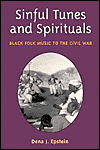

 |
Dena J. Epstein. Sinful Tunes and Spirituals: Black Folk Music to the Civil War, Urbana: University of Illinois Press, 2003. 464 pages. ISBN: 0252071506. Reviewed by William E. Montgomery, for the Journal of Southern Religion.
Originally published in 1977, Dena J. Epstein's Sinful Tunes and Spirituals cast a brilliant light on the origins of African-American folk music. Until then, scholars had debated whether African-American folk culture reached back to Africa or began only after slavery exposed Africans to European culture. This book put an end to the debate, at least insofar as music was concerned. It did so by providing documentation that previous scholars had not been able to find. The University of Illinois Press has reissued this important book with an updated preface.
Not an ethnomusicologist, Dena Epstein was for many years a music librarian at the University of Chicago. But in the 1950s, her interest in African-American musical traditions led her to search for their beginnings. Using the librarian's skills, she painstakingly combed through memoirs, diaries, travel accounts, and slave narratives for scraps of evidence that led to Sinful Tunes and Spirituals. The first part of the book focuses on the formative period from the late seventeenth century to 1800, presented not proof exactly but certainly persuasive evidence of the diffusion of African sacred and secular music in America. It concentrates on Britain's Southern colonies, but Epstein also defines African-American culture by contrasting the experiences of Africans in the West Indies to blacks on the North American mainland. Part Two examines the development and acculturation of African-American music through the antebellum period. And the third and final section details the "discovery" and publication of African-American spirituals by Northern missionaries during the Civil War and early Reconstruction years.
| "Epstein clearly illustrated the acculturation of both African and European musical patterns to each other." |
Epstein's patient reading of the sources enabled her to document the existence of a uniquely African-American music – singing, instruments, and dances – and to establish without a doubt that African traditions infused the musical expressions of African Americans. Equally important, however, Epstein clearly illustrated the acculturation of both African and European musical patterns to each other. The African-American spiritual fused European Christian hymnody together with black secular music, including texts, handclapping (a substitute for outlawed drums), and dancing. Traditional circular-motion African dances evolved into the "shouts" that were common features of African-American folk religion in the antebellum South. Black church leaders who were more influenced by European evangelical Christianity condemned all types of dancing and branded the "shout" as heathenish. Since Epstein found many of her descriptions in white sources, the book shows how white people responded to black folk culture.
A testament to the importance of this book has been the subsequent research it has inspired. The writing of such scholars as Sterling Stuckey, Eileen Southern, and Teresa L. Reed have added significantly to our understanding of the dynamic vitality of African-American culture. But Sinful Tunes and Spirituals remains the seminal work. Scholars will continue to consult it, and teachers will continue to assign it to students in their courses on cultural studies. Thanks to the University of Illinois Press for making it available in this reissued edition.
William E. Montgomery, Austin Community College
© 1998-2004 by The Journal of Southern Religion. All rights reserved. ISSN 1094-5234